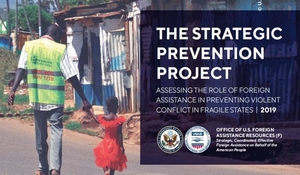Strategic Prevention Project: Assessing the Role of Foreign Assistance in Preventing Violent Conflict in Fragile States


“Strategic Prevention Project: Assessing the Role of Foreign Assistance in Preventing Violent Conflict in Fragile States”
Speaker: Quaranto, P. (US Department of State Office of US Foreign Assistance Resources)
Date: 30 September 2019
Speaker Session Preview
SMA hosted speaker session presented by Mr. Peter Quaranto (US Department of State Office of US Foreign Assistance Resources) as a part of its SMA General Speaker Series. To begin, Mr. Quaranto stated that the US and its international partners provide over $70 billion of resources to conflict-afflicted states per year. He then explained that the Strategic Prevention Project (SPP) focuses on stabilization in these highly conflict-afflicted states and also looks at states that may face future conflict and instability. The SPP has focused on three key research questions: 1) Under what circumstances does foreign assistance best contribute to the goal of making fragile states more secure and resilient against risks of violent conflict and instability?; 2) How can we measure the extent to which foreign assistance being provided to fragile states is contributing to this goal?; and 3) What reforms within the US and within partner governments would enable a greater proportion of foreign assistance to fragile states to contribute to this goal (or at least not inhibit it)? He stated that the SPP believes that the US needs to better utilize its resources and reduce its costs, achieve better results in countering transnational threats, and place an increasing focus on creating a competitive advantage for itself and for its partners in great power competition. To explore this assumption, the SPP conducted a literature review and interviewed over 100 experts on best practices for preventing conflict and instability in fragile states. The SPP also conducted a mixed-method pattern analysis of historic assistance spending for 11 fragile countries. Mr. Quaranto discussed the SPP’s findings, including the importance of 1) promoting inclusive and just political systems that foster social cohesion, 2) increasing institutions’ resilience to shocks and external threats, 3) promoting pro-peace constituencies, 4) recognizing that every context and country is unique, and 5) recognizing that a significant proportion of foreign assistance to fragile states has been devoted to economic growth, health, education and social services, with no stated links to prevention. To conclude, Mr. Quaranto provided five recommendations for US aid providers: 1) Establish agreed-upon principles for strategic prevention; 2) Apply strategic prevention principles across assistance planning and implementation; 3) Promote greater coherence between assistance and diplomacy for strategic prevention; 4) Mobilize data to track strategic prevention assistance in fragile states; and 5) Engage Congress and other donors to augment strategic prevention programming.
Speaker Session Audio Recording
To access a recording of this session, please email Ms. Nicole Omundson (nomundson@nsiteam.com).
Peter Quaranto

Peter Quaranto works as the Senior Advisorfor Peace and Security in the Department ofState’s Office of U.S. Foreign AssistanceResources (F). In this capacity, Peter leadsanalytical, research, and planning efforts toshape the strategic direction of U.S. foreignassistance toward addressing violent conflictand promoting security.
Peter spearheaded the U.S. government’s Stabilization Assistance Review (SAR): AFramework for Maximizing the Effectiveness of U.S. Resources to StabilizeConflict-Affected Areas (2018) and is currently leading the SAR’s implementation.Peter also led the Strategic Prevention Project: Assessing the Role of ForeignAssistance in Preventing Violent Conflict (2019): a State-USAID initiative toidentify ways to better target foreign assistance to priority fragile states to reducethe risk and severity of conflict.
Peter previously held positions at the State Department in the Bureaus ofCounterterrorism and African Affairs as well as the Office of the U.S. SpecialEnvoy for Sudan. On behalf of the State Department, Peter oversaw andcoordinated the U.S. strategy to mitigate and end the threat posed by the Lord’sResistance Army (LRA) in central Africa from 2011-2014.
Prior to working at the Department of State, Peter worked as a LegislativeAssistant for the U.S. Senate Foreign Relations Subcommittee on African Affairs.As a Marshall Scholar, Peter received Masters degrees from the University ofOxford and University of Bradford. He studied as an undergraduate at theUniversity of Notre Dame.
